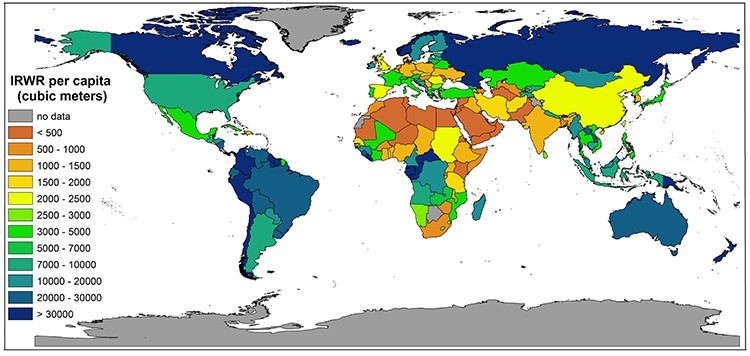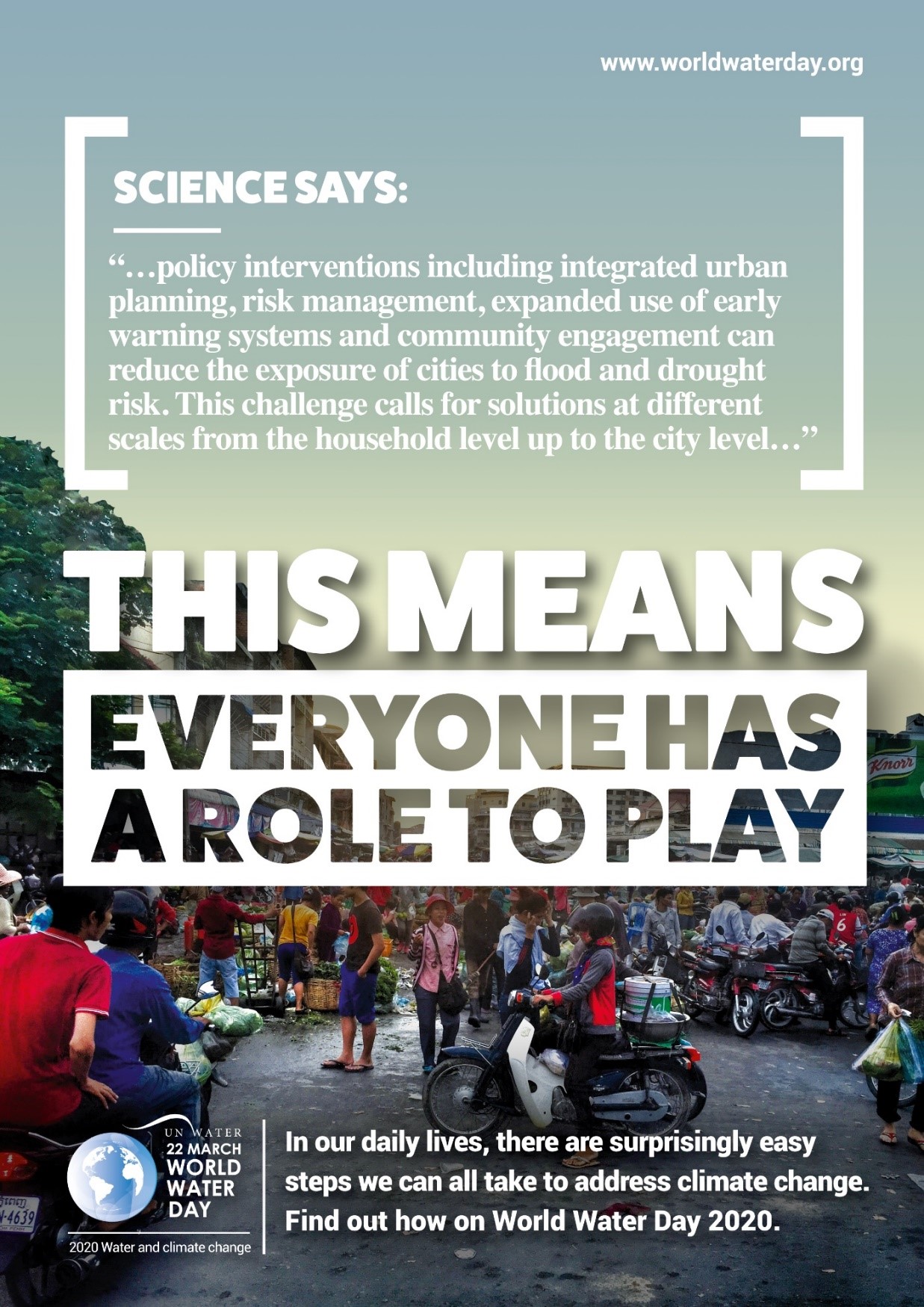World Water Day 2020: protecting our most precious resource
The term ‘water scarcity is defined as: “the lack of sufficient available water resources to meet the demands of water usage within a region.”
Despite some 70% of the earth’s surface being covered with water, freshwater is scarce – with just 3% of the planet’s water considered fit for human consumption.

Of that tiny fraction, a further two-thirds of this is unavailable to us, frozen into glaciers and icecaps, held in the ground and in the atmosphere. According to the World Water Council, some 1.1 billion people worldwide lack access to water, and a total of 2.7 billion find water scarce for at least one month of each year.
With the United Nations (UN) predicting that the global population will increase by 2 billion over the next 30 years – growing from 7.7 billion currently to 9.8 billion in 2050, and 11.2 billion by 2100[i] – demand for potable water will only rise, likely exponentially so. As the global population grows, so does the demand for water, threatening to deplete natural resource, and to damage the environment.
For years, climate scientists and researchers have warned that one of the primary effects of climate chance is ‘the disruption of the water cycle’. Across the globe, in the communities we have built and in our natural ecosystems, our use of – and therefore reliance on – water is integral and not just for drinking supplies, but for sanitation, food production, agriculture and energy generation. As the earth’s temperature continues to rise, the impact on global water resources has the capacity to be devastating.
The potential damage of climate change to the earth’s water supply is almost unimaginably far-reaching, with global trade and commerce also at significant threat, from government agencies to water utilities to farmers to residential water users. More than a decade ago, Paul Dickinson, CEO of the CDP Water Disclosure Project, aimed at promoting awareness of climate change and its water impacts to global businesses, warned that every sector should prepare for climate risk. Dickinson stated:
“Much of the impact of climate change will be felt through changing patterns of water availability, with shrinking glaciers and changing patterns of precipitation increasing the likelihood of drought and flood. If climate change is the shark, then water is its teeth and it is an issue on which businesses need far greater levels of awareness and understanding.”
How much have we learned, and how much tangible action have we taken, since then? Not enough, a glance at latest data would suggest. Many of the water systems relied upon to keep ecosystems and populations thriving have become stressed. Rivers and lakes are drying up or becoming too polluted to use. More than half of the world’s wetlands, a critical part of our natural environment, have disappeared. The impact is evident – and palpable – patterns of weather and water are altering, provoking more incidences of extreme weather, droughts and flooding.
It’s clear to see why one of the over-arching messages of this year’s World Water Day is: “we cannot afford to wait.”
World Water Day, held on March 22, every year, is an annual United Nations observance focusing on the importance of water, and why we must use our most precious resource more responsibly. This year’s theme, ‘Water and Climate Change’, highlights the pivotal role that water plays in how the world mitigates and adapts to the effects of climate change. In this year’s campaign, it calls to governments, policymakers, businesses and individuals alike to take action and to reduce water consumption and waste.
At Abdul Latif Jameel, the water challenge has been at the forefront of our agenda for some time, recognizing that this growing global issue cannot be ignored. In a recent Spotlight article: ‘Troubled Waters and the Path to Success’, Fady Jameel, Deputy President and Vice Chairman, Abdul Latif Jameel International, outlined his own commitment to the cause, and spoke about the progress that Abdul Latif Jameel, and our affiliates and partners, are already making.
Through Almar Water Solutions, a leading global developer of water infrastructure projects, we are already working hard to tackle the challenges of water scarcity and contamination, developing tailored water and infrastructure solutions to manage and mitigate impact of climate change.
Speaking at the recent Cop25 Climate Change Conference in Madrid, Spain, Carlos Cosín, CEO, Almar Water Solutions, commented:
“Climate change is here to stay. Water is a key pillar to fight against climate change and we have a responsibility to lead new practices and solutions that can help to alleviate water scarcity and contamination across the globe. Through innovation, and looking to new, non-conventional water resources, we can generate more effective treatments for a cleaner water supply, improved access to water in areas where it is scarce, and ultimately support in building a more sustainable future.”
The impact of Almar is already evident in four countries susceptible to water scarcity: Egypt, Bahrain, Saudi Arabia, and Kenya, delivering drinking water to millions of people, some in areas of extreme water stress.
In 2019, Almar acquired Osmoflo SpA, a progressive water treatment company headquartered in Chile – a country who recently declared water scarcity in over 50 communities across three regions. With this acquisition, Almar Water Solutions aims to further address Latin America’s ongoing water challenges, providing diverse, flexible and high technology water and wastewater solutions.
Almar’s philosophy is clear: the role of water in the battle against climate change is integral.
“We must use our water expertise to respond to challenges associated with sustainable development, taking our knowledge and best practice to new areas and providing water solutions to ensure that current and future generations enjoy a better life,” – Carlos Cosín.
With seawater desalination regarded as one of the most effective solutions to address water scarcity3, innovation is key to making the technology more readily available, without the need for costly infrastructure and centralized installations, especially for developing countries.
It is with this precise kind of innovation in mind that the Abdul Latif Jameel Water and Food Systems Lab (J-WAFS) operates from the Massachusetts Institute of Technology (MIT) in Boston, searching for the technical breakthroughs that could transform the water sector as a whole.
Founded in 2014, in an effort to bring together all of MIT’s strengths and world-class research practitioners to the challenge of meeting the world’s need for water and food, J-WAFS has facilitated a range of contributions to these critical challenges.
One project receiving seed grant funding from the Lab is led by Professor Julia Ortony. It aims to develop a new and long-lasting filtration material that can help to remove the naturally-occurring arsenic that contaminates much of the groundwater in South Asia. Meanwhile, Associate Professors Mircea Dincă and Evelyn Wang have perhaps produced the most eye-catching research of all: they are looking at ways to literally harvest water out of the air. If successful, their research could revolutionize the prospects of water-stressed and remote areas around the world.
Another research team, led by scientists and academics from the Lab, MIT and China, has developed a completely passive solar-powered desalination system, harnessing sunlight to make fresh potable water from seawater. If effective, the technology could provide more than 1.5 gallons of fresh drinking water per hour for every square meter of solar collecting area. The system could potentially serve off-grid arid coastal areas to provide an efficient, low-cost water source.
As Stanford Earth states: “the way we treat the planet has direct consequences on human health”, and we all have a responsibility to make positive changes at an individual level.
GRACE Communications Foundation, a US-based non-profit dedicated to creating a more sustainable food system; has developed an online Water Footprint Calculator, which exposes some eye-opening truths. The free tool demonstrates how our everyday habits and actions – from brushing our teeth to washing our cars – can have a profound impact on water use.
The World Water Day toolkit, developed by the UN, outlines some surprisingly easy steps we can all take, on a daily basis, to address climate change and to make a meaningful impact:
- Limit showers to five minutes or less;
- Choose more plant-based meals;
- Turn off sleeping tech;
- Limit food waste by reusing still-edible food;
- Make sustainable shopping choices.
One thing is clear: doing nothing is not an option. The fight against water scarcity and climate change requires a global effort – and we cannot afford to wait.
Read more about what you can, personally, to do make a difference here.

[i] Source: UN.org





 1x
1x


 Added to press kit
Added to press kit


